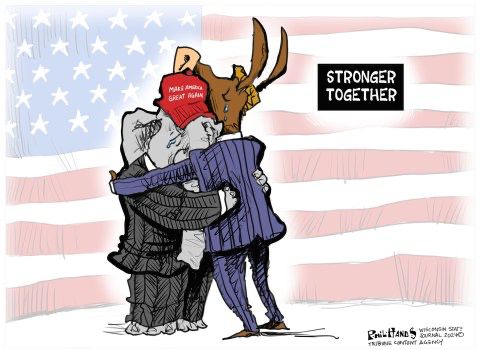I’m a Democrat, but I’ll vote for Republicans that have not been enslaved by Trump in order to restore the bipartisanship that solved America’s most divisive issues over two centuries and to recapture the Democracy that Trump destroyed by removing him.
Only once during Trump’s tenure did bipartisanship solve a major divisive issue, and it was really too close to call it real bipartisanship. When Republicans were accommodating Trump’s obsession to repeal Obamacare, which would have cost 18 million Americans their health insurance in the first year and 32 million over 10 years, only three Republicans voted against the repeal. They were Senators John McCain, Susan Collins and Lisa Murkowski. The other 49 voted to repeal it.
It’s important to remember the Republicans who worked out the parties’ differences across bitter divides so many times throughout our history:
- In 1964, a civil rights bill faced widespread opposition from Southern Democrats and conservative Republicans. It took the Senate’s longest filibuster in history until Democrat Mike Mansfield asked Republican Everett Dirksen to join him “in finding … the resolution of this grave national issue,” and they did, passing the landmark Civil Rights Act of 1964.
- Democrats and Republicans were able to bridge their historic division over welfare by compromising to enact welfare reform in 1966.
- Bills to impose limits on food stamps were opposed by Democrats. But Senators Bob Dole and George McGovern found a compromise, and the Food Stamp Act became law in 1977.
- In the 1980s the Social Security Trust Fund risked running a deficit. Measures to keep it solvent faced deep opposition. Enter Senators Patrick Moynihan and Bob Dole who worked together to defuse the deep partisanship, and Social Security reforms were passed and signed by President Reagan.
- In 1990, Republicans argued that the Democrat-sponsored American Disabilities Act was overaccommodating and placed undue burden on employers. Both parties came together, compromised, and passed it.
- In 1997, conservative Republicans opposed the State Children’s Health Insurance Program as a budget buster. Together, Senators Ted Kennedy and Orrin Hatch made changes and got it passed.
- Obama extended the Bush tax cuts, angering Democrats who felt they favored the wealthy. A bipartisan compromise extended unemployment benefits to avoid middle-class tax increases.
- The 2012 Jobs Act was, as House Majority Leader Eric Cantor said, “a rare legislative victory where both sides worked together and passed it with strong bipartisan support.”
- The 2013 Bipartisan Budget Act set discretionary spending halfway between what Senate Democrats and House Republicans wanted.
So you can appreciate the importance of bringing bipartisanship back to political parties that have never been so hostile to each other until Trump came on the scene. Sadly, Congressional Republicans obey Trump because they fear being defeated by a primary challenger backed by him. So, I’ll vote for Republicans who put the welfare of their constituents and of America over keeping their seats







